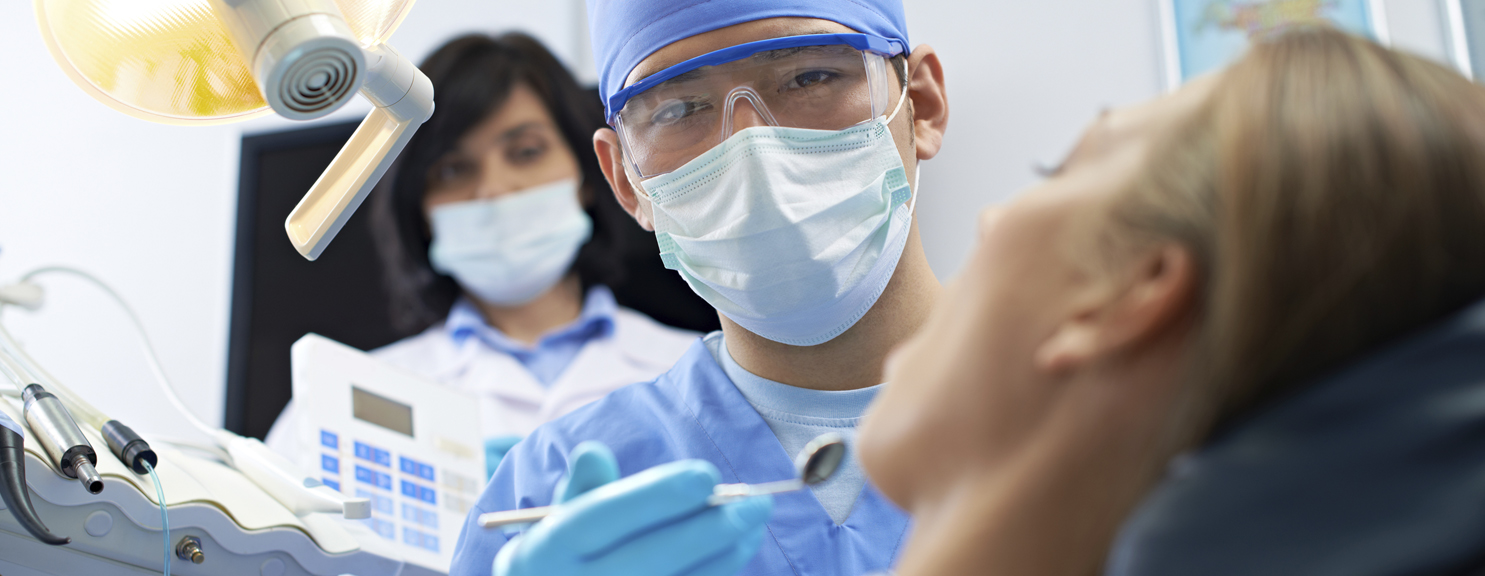What Do Dentists Do?
Dentists diagnose and treat problems with teeth and tissues in the mouth, along with giving advice and administering care to help prevent future dental problems. They provide oral health education and instruction on diet, brushing, flossing, and the use of fluorides. They remove tooth decay, fill cavities, examine x-rays, place protective sealants on children’s teeth, straighten teeth, extract or repair damaged teeth, and perform corrective surgery on gums and supporting bones to treat gum diseases.
Dentists also prescribe medication, such as antibiotics, and administer anesthesia.
While most dentists are general practitioners, some choose to specialize. Dental specialties include:
- orthodontics (treatment of abnormalities in teeth and jaws using devices such as braces and retainers);
- oral and maxillofacial surgery (surgical procedures on jaws or mouth);
- pediatric dentistry (oral health care for children and adolescents);
- periodontics (treatment of disease of the gums and bones which support the teeth); and
- public health dentistry (promoting oral health through organized community efforts).
Dentists usually employ and work with dental hygienists and dental assistants.
For more information: http://www.bls.gov/ooh/healthcare/dentists.htm.
Where Do Dentists Work?
The vast majority of dentists work in private group or solo practices. Some may also work in dental clinics, hospitals, or in academic settings.
How Much Do Dentists Earn?
In 2022, the average annual income reported by the Bureau of Labor Statistics (BLS) for dentists in the United States was $172,290. The New York State Department of Labor (NYSDOL) reports that, in 2023, dentists in New York earned a median annual salary of $175,621 (dentists in the 25th percentile made approximately $87,915 while those in the 75th percentile made approximately $236,595).
Earnings for dentists vary according to number of years in practice, location, hours worked, and specialty. Specialty dentists generally earn more than general dentists. Also, self-employed dentists in private practice tend to earn more than salaried dentists. Dentists who are salaried often receive benefits paid by their employer, with health insurance and malpractice insurance being among the most common. However, like other business owners, self-employed dentists must provide their own health insurance, life insurance, retirement plans, and other benefits and pay for their own business expenses, such as supplies, equipment, malpractice, and staff.
Supply and Demand
The Bureau of Labor Statistics projects that the number of jobs for dentists in the U.S. will increase by 6% between 2021 and 2031. The New York State Department of Labor projects that the number of jobs for dentists in the state will increase by 15% between 2020 and 2030. The demand for dental care in New York and around the country is expected to increase as the population ages.
For more information on projections by New York State labor regions, 2018-2028, click here.
New York Educational Requirements
Dental education programs are four years in length and generally include two years of classroom and laboratory instruction and two years of practical clinical experience, usually through supervised direct patient care. A growing number of dental school graduates are choosing to enter one- or two-year residency training programs.
Individuals interested in a career in dentistry must complete at least 60 credit hours of college study and usually have a bachelor’s degree. They are encouraged to take courses in biology, chemistry, anatomy, microbiology, and physics as an undergraduate. Students interested in attending dental school must take the Dental Admission Test.
New York Licensure Requirements
Dentists who practice in New York must be licensed and requirements include graduating from an accredited dental education program and passing the National Board Dental Examination. Continuing education is also required for active dentists to maintain licensure. Dentists can also get a certificate to administer general anesthesia, parenteral conscious sedation, or enteral conscious sedation. For more information: https://www.op.nysed.gov/professions/dentists/license-requirementshttp://www.op.nysed.gov/prof/dent/dentlic.htm.
Financial Support
The American Dental Association Foundation offers a variety grants, awards, and scholarships to dental students. For more information, please go to: http://www.adafoundation.org/en/how-to-apply.
The American Dental Education Association (ADEA) also has scholarship, awards, and fellowship information: See this page on their website.
Education Programs in New York (subject to change)
| Columbia University College of Dental Medicine 630 West 168th Street New York, NY 10032 (212) 305-3478 |
New York University College of Dentistry 345 East 24th street New York, NY 10010 (212) 998-9800 |
| Stony Brook University School of Dental Medicine 100 Nicolls Rd Stony Brook, NY 11794 (631) 632-6000 |
University at Buffalo School of Dental Medicine 315 Squire Hall Buffalo, NY 14214 (716) 829-2839 |
Additional Web Links
For more information on dentists, go to the American Dental Association website at: http://www.ada.org/; or the New York State Dental Association at: http://www.nysdental.org/.
[whohit]Dentists[/whohit]

